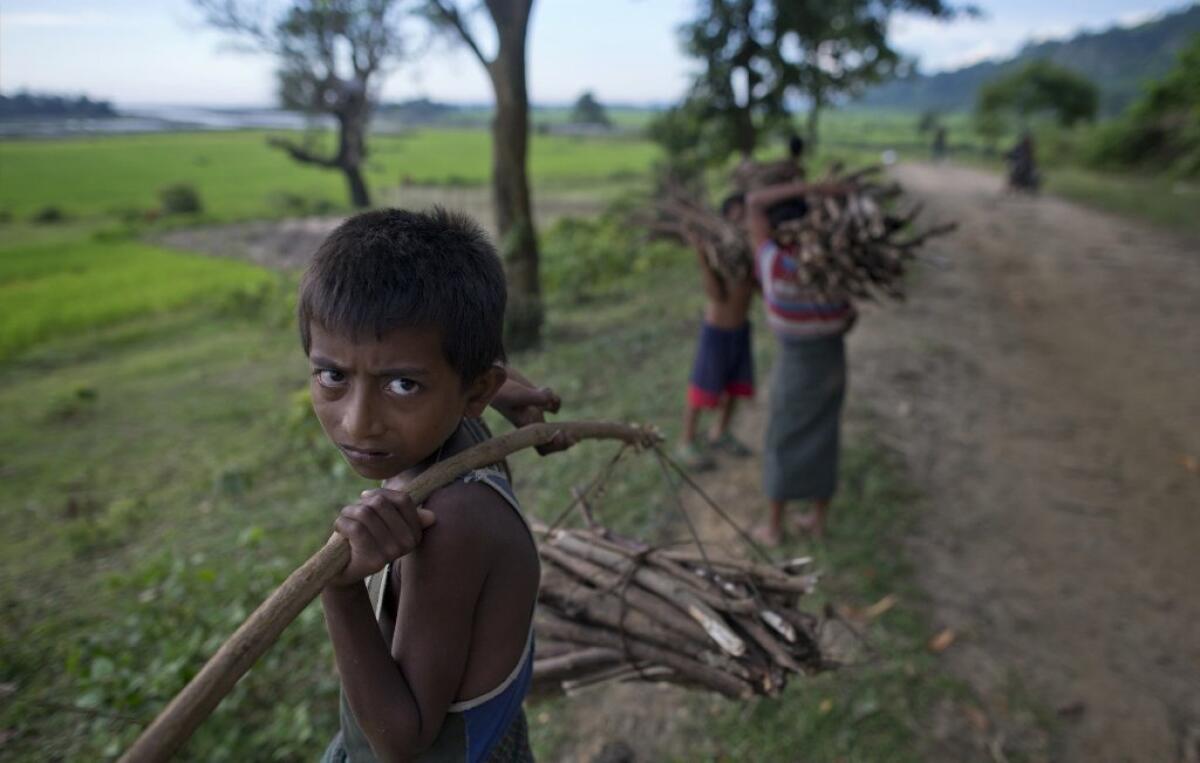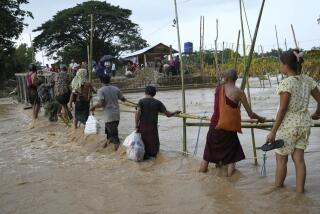The plight of Myanmar’s Rohingya

- Share via
Myanmar, the country formerly known as Burma, has made substantial progress in the last few years, moving from military rule toward democracy, releasing political prisoners and freeing from house arrest Nobel Prize-winning democracy activist Aung San Suu Kyi. However, the government has relentlessly continued its appalling treatment of the Rohingya population that lives in Rakhine state in western Myanmar.
A Muslim minority in an overwhelmingly Buddhist country, the Rohingya are effectively denied citizenship unless they can meet onerous requirements, such as tracing their lineage back decades. They are restricted in where they can live and work, are limited to having two children and have been subject to brutal violence at the hands of mobs unchecked by local police. More than 1 million Rohingya live in Myanmar, including about 180,000 in squalid internal displacement camps, according to Human Rights Watch. The United Nations has deemed the Rohingya one of the most persecuted groups in the world.
Recently, violence against the Rohingya has escalated, according to the Office of the United Nations High Commissioner for Human Rights. Two attacks in January left an estimated four dozen Rohingya dead in a village in Rakhine, according to the U.N. report. Myanmar’s response has been to deny that it happened.
PHOTO ESSAY: Obamacare -- and 8 other bungled launches
Late last month, Doctors Without Borders was ordered by the government to shut down its extensive operations across the country. Two days later, it was allowed to resume working everywhere except in Rakhine, where the organization provided primary care to tens of thousands of Rohingya.
This state-sponsored oppression must end. Myanmar needs to lift restrictions against the Rohingya and revamp its citizenship requirements. Security forces under government control should be deployed to Rakhine to supplant or oversee local police, who are often too prejudiced against the Rohingya to do their jobs properly. The government should also allow humanitarian groups back into Rakhine to provide aid and to monitor how the Rohingya are treated.
And it should investigate this latest mass killing. The U.N. report notes that some of the Rohingya played a role in the violence — they killed a police sergeant in retaliation for the initial killing of eight Rohingya villagers. That’s not excusable, but it’s also no excuse for continued mistreatment of the entire group.
Over the last few years, the U.S. has generously applauded the government of Myanmar for its steps toward democracy. President Obama has visited the country; an American ambassador has been installed. Now the United States should press President Thein Sein harder and call for him to extend that democracy to the Rohingya.
It’s unconscionable that Suu Kyi, a human rights icon, has not wielded her considerable moral authority to talk about this issue. She should abandon her diffident stand on the plight of the Rohingya and forcefully condemn the repression of and violence against them. It’s heartening that she is a member of the Burmese Parliament now and hopes to secure a change in the constitution that would allow her to run for president. But a strong leader would not allow short-term political expediency to keep her from speaking out on a critical, life-and-death issue.
More to Read
A cure for the common opinion
Get thought-provoking perspectives with our weekly newsletter.
You may occasionally receive promotional content from the Los Angeles Times.










